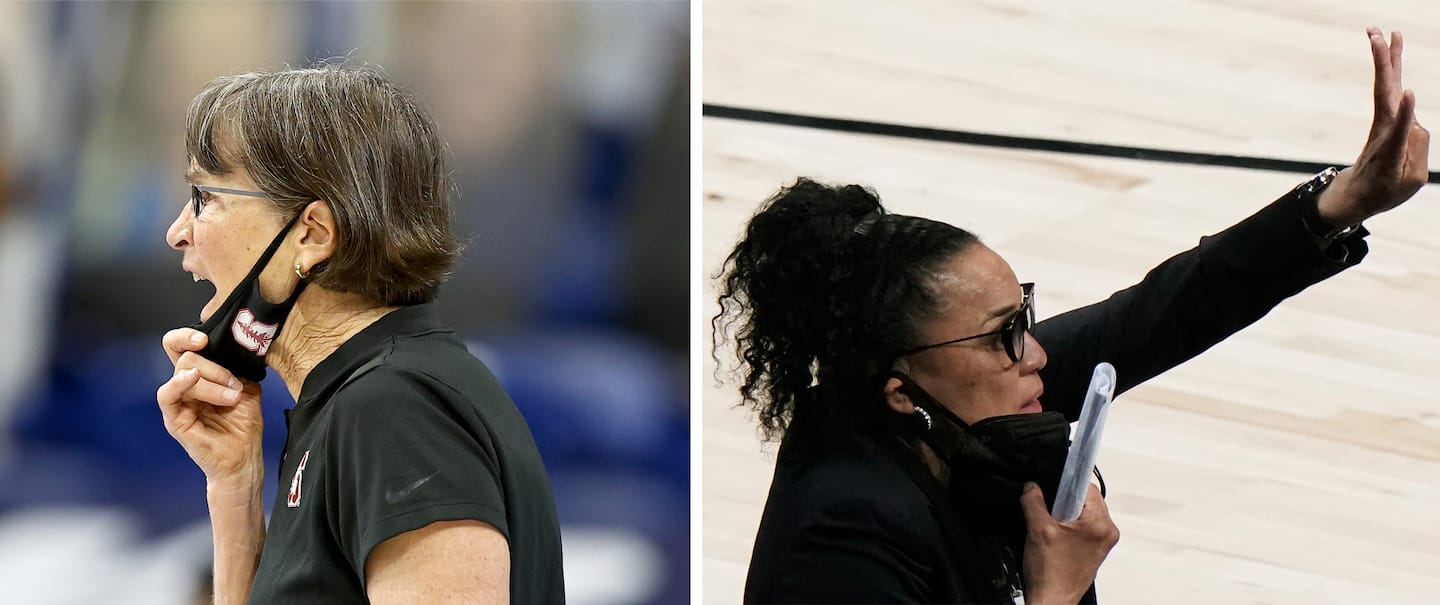Twenty-five years ago, the U.S. women won basketball gold and established a legacy

This Final Four tells an uplifting story that covers a quarter-century of exquisite stewardship. Twenty-five years ago, a transformative U.S. women’s basketball team dominated the Olympics in Atlanta and served as a thrilling opening act for the formation of a sustainable professional league. Dawn Staley, the South Carolina coach, was a backup point guard on that team. Tara VanDerveer, the Stanford coach, took a year off from the Cardinal and guided the group to a 60-0 record that culminated with eight almost flawless Olympic performances.
On Friday, the two meet again, with an appearance in the national title game at stake. They’re friends and familiar rivals, leading championship programs that can’t avoid butting heads. But their latest meeting feels particularly special because it frames the unending journey since 1996. In this matchup, you see the legacy of that Olympic team, the continued excellence of women’s basketball and the importance of reckoning with what truly holds back the game.
Consider it all, and you should be left with the strong conclusion that, as with all issues of equality, the question isn’t how the sport can achieve its way out of second-class treatment. It isn’t about what the sport needs to do to elevate itself. The problem is a resistance, mostly from men, to acknowledge the value that requires only amplification.
Despite the impediment, the game has risen so much. And it has grown only more adamant about going higher.
“I’ve always celebrated the small victories, but now, with social media and a social climate in which we’re talking about inequality and injustice across all spectrums, there’s a chance to pursue a big victory,” said Jennifer Azzi, a guard on the 1996 team who also played for VanDerveer at Stanford. “We’re in a moment and a movement in which the everyday person sees what’s wrong more clearly, I hope. I think it’s an amazing time to push for change.”
As the WNBA prepares to celebrate its 25th anniversary this summer, the Final Four is an ideal precursor. In April 1996, the WNBA declared, “We Got Next.” The American Basketball League, which lasted for two seasons, also had been founded in 1995 and started playing in the fall of 1996. The women were going to get their chance, but they also felt strongly about asserting their international dominance. Team USA delivered a clear message, and the program enters the Tokyo Games this summer having won six straight Olympic gold medals.
But its greatest legacy may be opportunity. Arizona Coach Adia Barnes was in the middle of her college career when those American pro leagues began. She was among the first few college classes to be able to graduate, get drafted into the WNBA and have a long career before entering coaching. She’s a child of the movement. And now, she joins Staley as the first pair of Black women to coach in the same Final Four.
Talk to members of the 1996 team, and they delight in that fact more than anything. They bring it up unsolicited and point to Staley’s influence on the profession. They marvel at how the current generation has become determined about celebrating the authenticity of the women who play basketball.
“Our history here in women’s basketball is so filled with so many Black bodies that for this to be happening in 2021, to me, is long overdue, but we’re proud,” Staley said.
Said Rebecca Lobo, now an ESPN analyst: “Female athletes and female athletes of color have made that charge, pushed for it. When we played, society was different. There wasn’t a lot of pushing to be accepted in a way that wasn’t mainstream. Now you’re seeing strong, powerful women, not just as it related to their athletic bodies, but a power of personality and conviction. I can’t be more proud of what it has become. They’re speaking out, holding to their convictions, pursuing social justice. I’m so happy they’re empowered in a way that wasn’t the case 25 years ago or even 10 or 15 years ago.”
The stars from 1996 decline to accept too much credit. They focus on what the experience meant to them. They don’t remember feeling pressure as much as a commitment to prove a point after the United States had stumbled to a bronze medal in 1992. There were moments of anxiety. Azzi recalls Lisa Leslie being unable to eat breakfast before the first Olympic game. Azzi couldn’t take a bite, either. The players felt for VanDerveer, their detailed, cerebral coach who would bear the burden if they somehow lost.
“I think we felt some of it for each other in general,” said Azzi, the former San Francisco coach who is now the school’s associate vice president of development. “The NBA had invested in us. USA Basketball had invested. We understand that, but we didn’t think of it as pressure. It was motivation to us. We knew we were going to win. There was no question. No one had trained like we had trained. We were on a mission.”
It’s a mission that continues today, within the USA Basketball program that Staley now coaches and the entire sport. So much evolution. So much stagnancy. But even more determination. These Final Four coaches capture the state of the sport well. Connecticut remains the standard. In a sense, Staley is the new VanDerveer, a coaching lifer who will influence generations. In leading Arizona to its first Final Four, Barnes shows there is room for brilliant young coaches to create rising programs, even though the established giants are so difficult to move.
It will end as an extension of the legacy of 1996 and all the other formative moments of women’s basketball. The women have had next for a long time. They deserve now. And they’re determined to get it.






